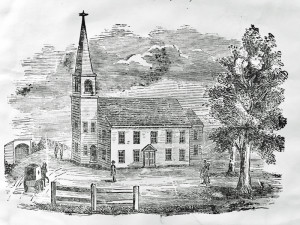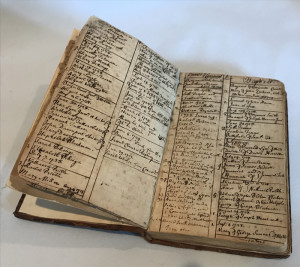True Tales: Treason and Revolution
By George T. ComeauOn an August night in 1776, long shadows cast across the room as Samuel Dunbar sat in his study contemplating what he was about to do. The die had already been cast, yet he would find in his voice the moral, religious, and political authority to do what would certainly be considered high treason against the King of England. And, with measured consideration, he began to write carefully.

A woodcut of the First Parish Church that served the congregation from 1747-1824 (Collection of the Canton Historical Society)
At 71 years of age, Reverend Samuel Dunbar was the at the center of the community now known as Canton and then known as Stoughton. Dunbar was in the twilight of his life, living in relative luxury that he had earned through 49 years of ministry to the people here in this small, rural community. The son of John and Margaret Dunbar, at a very early age he attracted the attention of the Reverend Cotton Mather. Mather held the strictest of religious doctrines, best exhibited by his views on witchcraft and the subsequent hangings at Salem. For some reason, Dunbar was taken under Mather’s guidance. Through Mather’s direction Dunbar attended Boston Latin School and Harvard College. By 1727, the people of Canton reached out and sent letters of inquiry asking that the 23 year old accept a ministry over the Church of Christ in Stoughton.
The first minister, Joseph Morse of Canton, had come to the “New Village,” now Canton, in 1707 and remained here as the spiritual guide for almost 11 years. The end of Morse’s tenure was marked with intense controversy and the congregation’s relationship soured to the point that the Great and General Court became involved in the dispute over “wicked irregularities.” With the dismissal of Morse came the arrival of Dunbar and a relationship that would last a lifetime.
Dunbar accepted the offer to become the second minster and in doing so he began decades of service to God, the Crown, and the people of Canton — likely in that exact order. At the end of his first year he wrote, “I would bless God, who has carried me through one year so comfortably, and has given me such success in my labors and ministry.” During that year, Dunbar baptized 69 babies, married 11 couples, and buried 19 of his neighbors. All in all, it was a good life. The people of the town provided a comfortable living and plenty of wood for the winter fire. Dunbar presided over a simple wooden church beside the cemetery and a house on what is now Chapman Street.
He was an extraordinary man in just about every respect, and was regarded as a man of solid character and steadfast rigidness and yet individuality of character. His sermons, which we have fine records of, burgeoned with scripture and were punctuated by ornamental quotes. Perhaps the most highly educated man in early 18th century Canton, Dunbar was fluent in the then critical knowledge of Latin, Greek, and Hebrew. In all, Dunbar’s lifework oversaw 1,703 baptisms, the marriage of 690 couples, and his attendance of 682 funerals. Such was his impact that he preached over 9,000 sermons. This was a giant of a man in breadth and influence.
There was not a single occasion that Dunbar’s health prohibited him from the pulpit as a result of sickness. Dunbar was a bold and persuasive man that was influential in all matters of Colonial life. And his devotion to the Lord’s work even extended to obedience to the King of England. In 1745, Dunbar asked for leave of absence to become the chaplain for a regiment of his Majesty’s army to Fortress Louisburg. And yet his request was denied and he stayed home here in Canton. Ten years later in 1755, he finally served his king as a chaplain on an expedition to Crown Point and at Lake Champlain in a conflict against the French.
Years later, Dunbar began to have grave doubts about his personal allegiance with the Crown. He had served alongside Richard Gridley and Paul Revere in the expedition against the French, so he was certainly associated with the thinking of the Patriot cause. Yet by 1774, any misgivings about which side he was on were forever cast asunder as he attended what is considered the birth of liberty at the gathering of the congress at the Doty Tavern in the shadow of Great Blue Hill.
Dunbar, against the advice of family, friends and fellow ministers, attended the meeting that day in August and he opened with a prayer that was described as “the most extraordinary liberty prayer” ever heard. If there was doubt as to what side Dunbar was on when it came to revolution, it was cast asunder by his role as religious master to the company of Patriots that included Adams, Hancock, Revere, and Warren. He was forever known as the Son of Thunder.

Parson Samuel Dunbar’s handwritten diary from the years 1727-1775 (Collection of the Canton Historical Society)
And so we find Dunbar in his study on August 17, 1776, with pen in hand, and hunched over his desk about to deliver sermon number 8,059. And this was no ordinary sermon; this was dripping with treason and would mean certain death if he was ever to be captured merely writing, let alone speaking the words he put to paper. And yet with vigor in his convictions and in his 71st year of life, he proceeded to write in a code that he alone could read.
As the sun rose over Canton the next day, Dunbar woke early, said his own prayers, and dressed in a long black gown, snow white bands, a flowing gray wig, black short-clothes, with fine silver knee and shoe buckles. Arriving at the church, he saw the pews overflowing. Families gathered, for a great proclamation was to be read. Dunbar ascended to the pulpit and placed his sermon on the “sacred desk.” Pausing for the gravity of the moment, Dunbar moved forward with eloquence, wisdom, sincerity, and “the energy and decision of the ministerial industry, the piety and patriotism of the clergy of the Revolution.”
The sermon began and flowed for several pages in which Dunbar used biblical passages to compare the Jews and the Ten Tribes of Israel who rose up against their king with the 13 American colonies and their quarrel with King George. Then the tone of the sermon turned especially dark and foreboding. Of the king, he offered that he “has been making his little finger heavier than his grandfather’s loins; has been adding to our yoke and chastising us with scorpions; been making unrighteous and arbitrary laws, and altering fundamentally the form of our government, and has been deaf to the many humble petitions we have addressed to him; and has treated them with disdain and neglect, with insult an injury, and as a true tyrant has been and is using violent and bloody measures to compel our submission and obedience to his and his parliaments laws; has been, and is, sending his ships of war to block up our harbors, to intercept our trade, to destroy our seaport towns, and his armies of soldiers to waste and destroy our lives; and is at this time, transporting large armies of foreign mercenaries to complete the work of death, desolation and tyranny!”
This was all prelude to what he was about to read to the assembled community. “Such a tyrant the King of Great Britain has proved himself to these colonies. Such a great oppressor is he, as I shall presently prove to you. And therefore, the Continental Congress wisely declared the relation between the King of Great Britain is and ought to be totally dissolved. And, what I have now delivered to you is to prepare your mind for what I am required to read to you and to satisfy your conscience that you may lawfully accept the declaration of our being independent states and so exempted from all allegiance and obedience to the King and Parliament of Great Britain.”
What would come next would shake the congregation to its core and tear asunder neighbors and friends from the Crown and cast our town into a point of no return. Dunbar, with steady eye and clear voice, read from the pulpit the Declaration of Independence. And after he was through, he began the process of guiding his congregation to a point of strength and piety. “We have now done with George, King of Great Britain. We have no political relations to him. We have broken off of the connection with him and his kingdom.” Dunbar then proceeded to spend almost a half an hour absolving the men and women for what they would have to do in the coming revolution. Dunbar literally told the assembled that “when a King over a free people turns tyrant, it is lawful for such people to withdraw their allegiance to him.” In essence, he gave them the license to be free and relieved them of any misgivings they may have.
It was a momentous day in our town’s history and in the history of the founding of this nation. Dunbar lived to see freedom ring and the return of peace. Dunbar died in Canton in 1783 after 56 years of service and is buried in Canton Corner beneath a beautiful headstone recently preserved by the people of Canton. And his church is still strong today. For more than 300 years the First Parish Church of Canton has been a covenanted congregation that serves as a beacon of tolerance, love and charity. On October 28 and 29, we will gather as a community to celebrate the tricentennial of this congregation with historical tours, artifacts, and colonial games. The handwritten transcription of Dunbar’s sermon, as well as rare historical treasures, will be on display. We will visit Dunbar’s gravesite and pay tribute to the people of this congregation. Our civil history as a town — and the foundation of the Unites States of America — are inextricably tied to the First Parish, and their celebration is ours to behold and to share.
Check out Canton’s Attic in the September 14 edition of the Canton Citizen, featuring “Hair-Raising Artifacts” housed in the Canton Historical Society museum. Not a subscriber? Click here to order your subscription today (also available in digital form). Special 30th Anniversary Promotion for new in-town subscribers: $20 for 52 issues.
Short URL: https://www.thecantoncitizen.com/?p=37112










